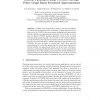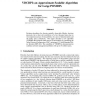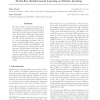85 search results - page 6 / 17 » Approximate Policy Iteration with a Policy Language Bias |
DEDS
2010
13 years 7 months ago
2010
We study approaches that fit a linear combination of basis functions to the continuation value function of an optimal stopping problem and then employ a greedy policy based on the...
PKDD
2010
Springer
13 years 5 months ago
2010
Springer
Partially observable Markov decision processes (POMDPs) are widely used for planning under uncertainty. In many applications, the huge size of the POMDP state space makes straightf...
PKDD
2009
Springer
14 years 1 months ago
2009
Springer
The goal of approximate policy evaluation is to “best” represent a target value function according to a specific criterion. Temporal difference methods and Bellman residual m...
NIPS
2004
13 years 8 months ago
2004
Existing algorithms for discrete partially observable Markov decision processes can at best solve problems of a few thousand states due to two important sources of intractability:...
ICML
2009
IEEE
14 years 8 months ago
2009
IEEE
We cast model-free reinforcement learning as the problem of maximizing the likelihood of a probabilistic mixture model via sampling, addressing both the infinite and finite horizo...



